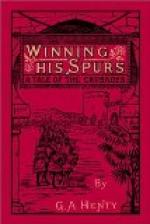Here were people drawn from widely separated parts of Saladin’s dominions. Here were Nubians from the Nile, tall and powerful men, jet black in skin, with lines of red and white paint on their faces, giving a ghastly and wild appearance to them. On their shoulders were skins of lions and other wild animals. They carried short bows, and heavy clubs studded with iron. By them were the Bedouin cavalry, light, sinewy men, brown as berries, with white turbans and garments. Near these were the cavalry from Syria and the plains of Assyria—wild horsemen with semi-barbarous armour and scarlet trappings. Here were the solid lines of the Egyptian infantry, steady troops, upon whom Saladin much relied. Here were other tribes, gathered from afar, each distinguished by its own particular marks. In silence did this vast array view awhile the solid mass of the Christians. Suddenly a strange din of discordant music from thousands of musical instruments—conches and horns, cymbals and drums, arose in wild confusion. Shouts of defiance in a dozen tongues and from 200,000 throats rose wild and shrill upon the air, while clear above all the din were heard the strange vibratory cries of the warriors from the Egyptian highlands.
“One would think,” said Cnut grimly to Cuthbert, “that the infidels imagine we are a flock of antelopes to be frightened by an outcry. They would do far better to save their wind for future use. They will want it, methinks, when we get fairly among them. Who would have thought that a number of men, heathen and infidel though they be, could have made so foul an outcry?”
Cuthbert laughed.
“Every one fights according to his own method, Cnut; and I am not sure that there is not something to be said for this outcry, for it is really so wild and fearful that it makes my blood almost curdle in my veins; and were it not that I know the proved valour of our knights and footmen, I should feel shaken by this terrible introduction to the fight.”
“I heed it no more,” said Cnut, “than the outcry of wild fowl, when one comes upon them suddenly on a lake in winter. It means no more than that; and I reckon that they are trying to encourage themselves fully as much as to frighten us. However, we shall soon see. If they can fight as well as they can scream, they certainly will get no answering shouts from us. The English bulldog fights silently, and bite as hard as he will, you will hear little beyond a low growl. Now, my men,” he said, turning to his archers, “methinks the heathen are about to begin in earnest. Keep steady; do not fire until you are sure that they are within range. Draw your bows well to your ears, and straightly and steadily let fly. Never heed the outcry or the rush, keep steady to the last moment. There is shelter behind you, and fierce as the attack may be, you can find a sure refuge behind the line of the knights.”




